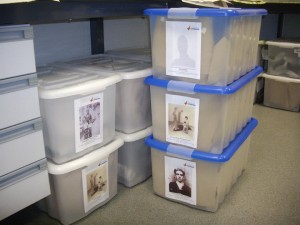Memory Without Borders: ARMH (2)

Remains of Francoist victims exhumed and identified by the ARMH in their forensic lab in Ponferrada, León, Spain.
Today the Spanish press covers another success of the ARMH [Association for the Recovery of Historical Memory, according to the Spanish abbreviation], which to date has carried out 153 exhumations of mass graves and recovered the remains of 1,330 victims of Francoist violence.
Spain is second only to Cambodia in terms of the numbers of victims who lay in unmarked mass graves, in killing fields, as it were. But because of the economic crisis in Spain, combined with a right-wing government that is hostile to the movement of “recovering historical memory,” the ARMH will soon have to lay off its staff of three, and its ability to carry out exhumations and identify remains will be severely compromised.
DNA TESTS CONFIRM IDENTITIES OF THREE ANTIFRANCO GUERRILLA FIGHTERS, KILLED IN 1943
ABC/EFE, 16 January 2013
The Vice-President of the ARMH, Marco González explained that the remains that were exhumed in September of 2010 from a mass grave, situated near the Church of Vilavella, are thos of Pedro Voces Canóniga, Antonio Vega Guerrero and Félix Yáñez González.
In order to identify the bodies, the ARMH carried out anthropological profiles of the victims, which allowed them to determine the physical characteristics of the guerrilla fighters, and a forensic analysis to clairfy the causes of death, which, according to González “were very obvious in this case, since they had been shot.”
The ARMH then requested DNA samples from relatives of the possible victims, who live in the area … Fortunately, the remains were in good condition, and the analyses were able to show, with 99.9% certainty that they belonged to the three fighers, killed in 1943.
Their bodies remain in the laboratory of the Association, but now that the task of identifying has been completed, “the families of the victims will decide what to do with the remains” said González.
He went on to express his desire that a public act be organized to pay homage to the victims, perhaps near their place of birth in El Bierzo, León. “We must remember that they took to the hills to defend their ideals and to continue the fight against a coup d’etat.”












